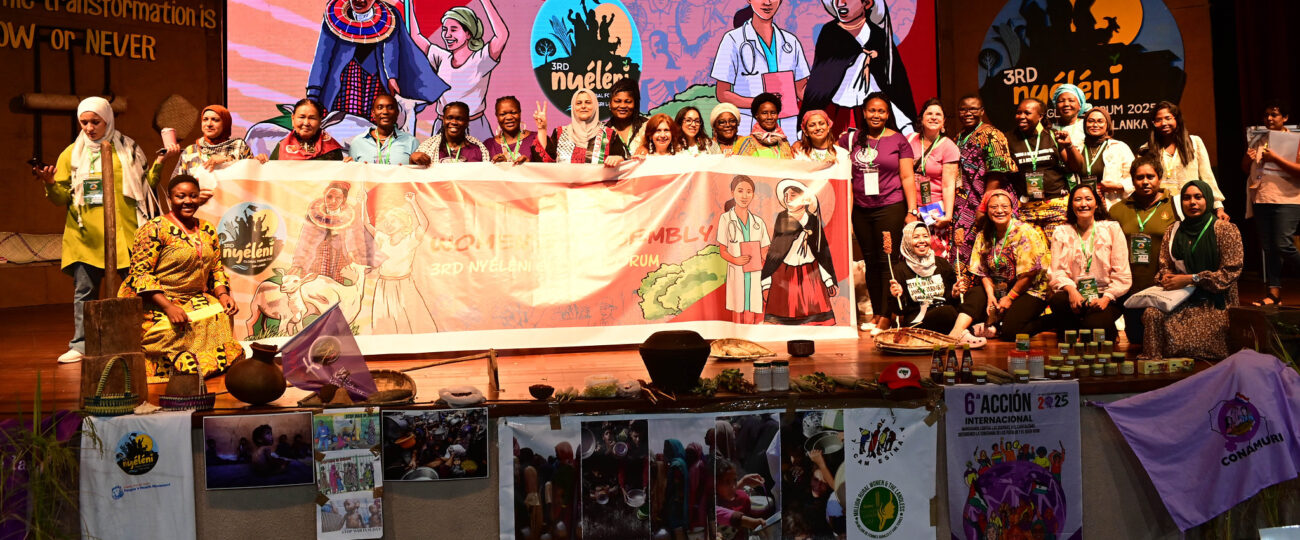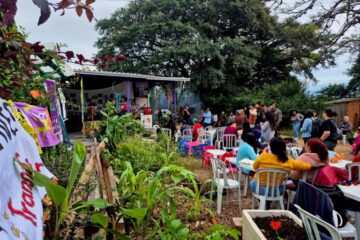Since its first edition in Sélingué, Mali, in 2007, the Nyéléni Forum has been a milestone in collective political building. At that time, a strategic alliance of global grassroots movements drew up a powerful platform for the struggle for food sovereignty that inspires mobilizations, political changes, organizational experiments, and agroecological practices to this day. The third edition of the Nyéléni Forum is taking place from September 6th to 13th in Kandy, Sri Lanka, with global movements and organizations coming together to build a common political platform for systemic change. The Women’s Assembly was held on September 7th to discuss feminist proposals for the common agenda that will be built at the forum.
Sri Lanka
Women make up 52 percent of Sri Lanka’s population. They are the primary workforce in Ceylon tea production, in the textile industry, and in domestic labor. Anuka de Silva, a member of La Via Campesina and the Forum’s Coordination Committee representing Sri Lanka, opened the assembly by sharing the reality of women in the country. “Sri Lankan economy is run by women, but nobody acknowledges that. In the plantation, women are doing hard work without getting good wages. Same way, women in the garment factories are living in a real hard condition, without good wages, they don’t have a life. There is much violence happening in the industrial zones. And also as domestic workers, a lot of women immigrate to the Middle East to work as domestic workers.”
Anuka provided an assessment of the major economic crisis the country is experiencing, from the federal level to communities, families, and households. “It’s not only debt at the national level, every household has microfinance debt. So many women committed suicide due to that huge debt crisis. This is coming with women’s tears, they are loosing their lives to this economic crisis.” Anuka then recalled the Tamil genocide and the struggle women who continue to search for missing persons are waging.
Women Building the Nyéléni Forum
The role of peasant women and feminism in building the struggle for food sovereignty and the previous editions of the Nyéléni Forum was highlighted at the Assembly. Elizabeth Mpofu, former general coordinator of La Via Campesina, spoke about the first edition, which took place in 2007 in Mali. She recalled how the struggle for food sovereignty was the alternative created by the movements to combat the neoliberal agendas around production, distribution, and access to food both in rural and urban areas. She said about the 1st Forum: “We wanted to strengthen a dialogue among different sectors. It was also a moment of mobilization of many sectors to understand more about food sovereignty. Together we were supposed to come up with strategies and also take action, especially for our global food sovereignty movement, to secure food sovereignty as a fundamental human right.”
The second edition of the Nyéléni Forum took place in 2015 and was recalled by Nicole Yanes of the International Indian Treaty Council. She highlighted agroecology as a key issue, given its co-optation and institutionalization. “It was being used by the Food and Agriculture Organization of the United Nations, by all these entities that were going to just say, ‘this is about technical solutions.’ And what we were saying was that this is ours. It’s traditional and peasant knowledge, and traditional systems. It does not come from a research paper from a university. Agroecology means that we stand together in a circle of life. And in this circle of life, women play a very key role.” Nicole also highlighted how women were questioning patriarchy not only in the capitalist system as a whole, but as relations of oppression that pervade their own movements and families.
Yıldız Temürtürkan, international coordinator of the World March of Women, said that the path to the 3rd Nyéléni Global Forum began to be mapped out during the 8thInternational Conference of La Via Campesina. Grassroots organizations and movements built a shared agenda that could contribute both to the Forum and to their own agendas. For this reason, “the Women’s Assembly is the most important convergence space. That brings us together as women from different movements and organizations from broader levels in order to construct a common agenda. In the World March for Women, we always say that diversity and plurality is not a challenge, but it is our strength. And here we can see how grassroots feminism is a strong subject to constructing the future to transform the world.”
The main objective of the Assembly was to build women’s feminist contributions to the Joint Political Action Agenda, the political program resulting from the Forum. The women converged on a common proposal based on feminist economy, which puts care, equality, and the good living of the communities at the center of life while challenging patriarchal capitalism. It values care work, collective work, and women’s participation. Their message is clear: there can be no systemic change without feminism.
Women’s proposals bring together the struggle for democracy, rights, and peace, understanding the ways in which wars directly destroy women’s lives and the peoples’ living conditions. They affirmed the feminist demand for demilitarization, peace, and international solidarity. They also defended food sovereignty and agroecology, understanding agroecology as a transformative project and practice and not just a technical one. In building agroecology, the movements emphasize the need to combat gender-based violence, which reduces women’s autonomy in food production. They defend access to land, water, and other common goods, understanding that a feminist agrarian reform means that women have rights and access to land and the conditions to produce. Women fight for fair health care that includes sexual, reproductive, and mental health, putting an end to violence in these areas. Organized, they build and demand energy sovereignty and climate justice, rejecting false corporate solutions.
The Women’s Assembly was a space of great participation and diversity, with discussions inspired by the contributions of Samah Abunina of La Via Campesina Palestine; Elise Pierrette Epmeno of the Intercontinental Network for the Promotion of Social Solidarity Economy (RIPESS); Nadine Nemchard of the World Forum of Fisher Peoples (WFFP); Farah Shroff of the People’s Health Movement (PHM), Maamankhu Sodnom of the World Alliance of Mobile Indigenous Peoples (WAMIP); Kirtana Chandrasekaran of Friends of the Earth International; and Sophie Dowlar of the World March of Women. In the coming weeks, Capire will publish some of these contributions.




